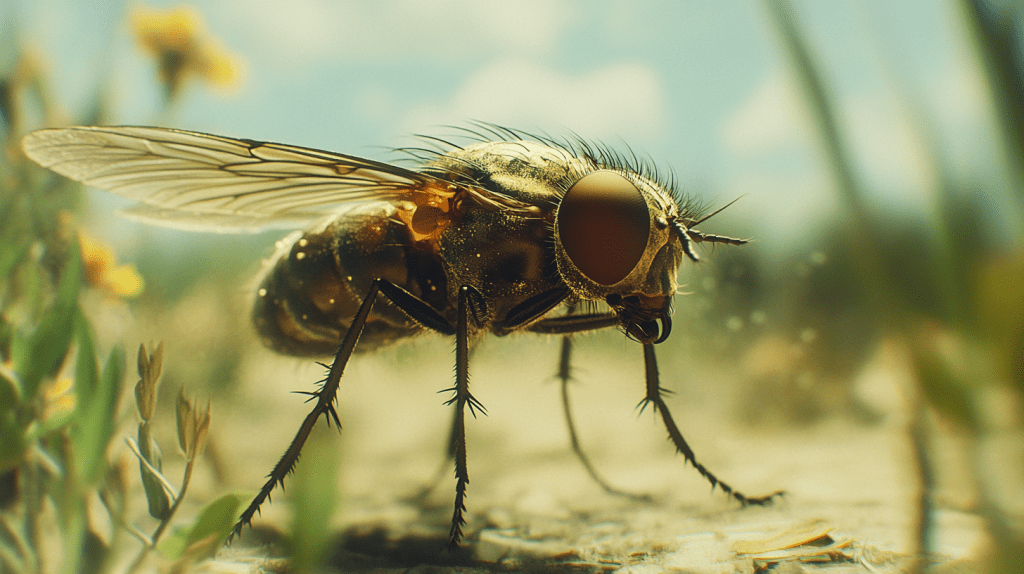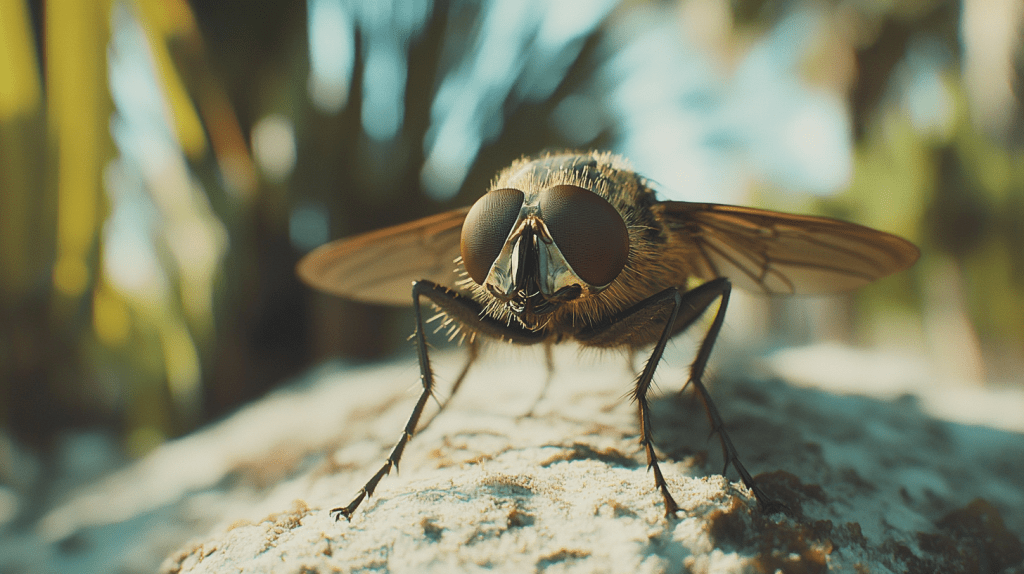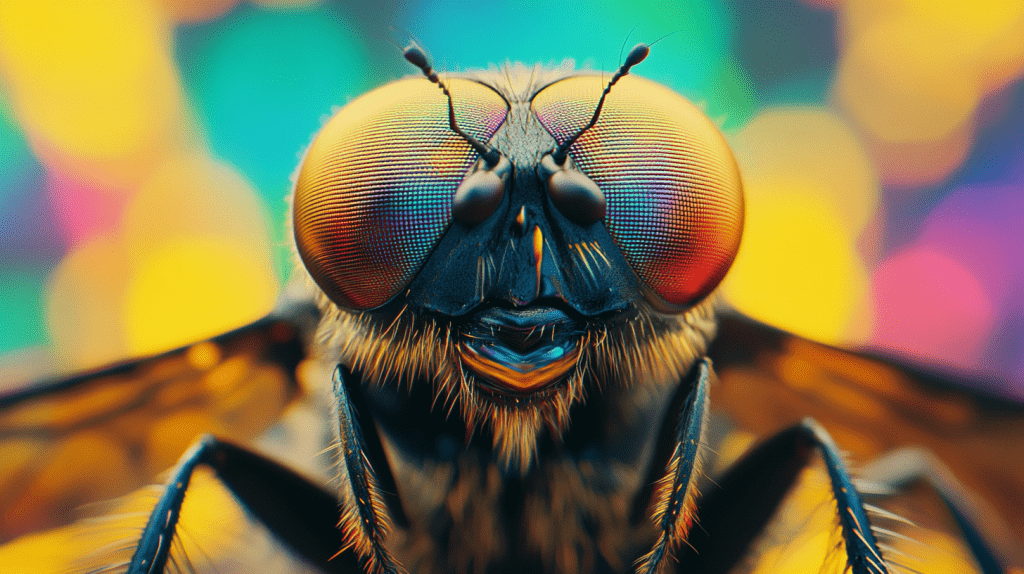
Table of Contents
Dealing with horseflies in Venice, FL, can be more than just a nuisance; it’s downright painful. If you’re looking to get rid of horseflies for good, you’re in the right place. These buzzing pests are drawn to warmth, movement, and dark colors—meaning a sunny day on Florida’s Gulf Coast can quickly turn into an irritating battle with these relentless biters. Unlike the familiar sting of a mosquito, a horsefly bite is much more painful due to their razor-sharp mouthparts. And for those spending time outdoors or working with animals, these persistent pests can be particularly unwelcome, returning again and again even after being swatted away.
In Venice’s humid, warm environment, horseflies thrive in wetlands and areas close to water, making them frequent visitors to yards, farms, and coastal spots. Knowing why they’re so attracted to certain areas—and how they detect us through heat and movement—offers valuable insight into how to keep them away. From sticky traps to natural deterrents, there are effective ways to reduce their numbers and reclaim your outdoor spaces. Let’s dive into the best methods to get rid of horseflies so you can enjoy a peaceful, pest-free day in Venice’s beautiful outdoors.
Key Takeaways
- Identify and Understand: Recognize horseflies by their size, dark colors, and painful bites. Only females bite, as they need blood to produce eggs, while males stick to nectar and pollen.
- Eliminate Attractants: Horseflies are drawn to warmth, carbon dioxide, and dark colors, especially near water sources. Managing vegetation, standing water, and light-colored outdoor setups can help reduce their attraction.
- Effective Repellents: Natural options like citronella, peppermint, and eucalyptus oils make for effective repellents. Homemade traps and commercial products also aid in reducing horsefly numbers.
- Outdoor Protections: Fans around seating areas, screens for pool spaces, and light-colored, long-sleeved clothing can discourage horseflies from lingering.
- Consider Professional Help: If horseflies persist despite your efforts, a pest control professional can offer targeted solutions, especially around areas with livestock or water sources.
By following these steps, you can create a more enjoyable, horsefly-free outdoor environment and make the most of Venice’s sunny days without the hassle of these relentless pests.
What Are Horseflies?
Horseflies are large, biting flies found near water bodies where larvae thrive. Females need blood for egg production, leading to painful bites. They are active during warm, sunny days and can be a nuisance for both humans and animals. Control methods include wearing protective clothing and reducing standing water sources.
Identifying Horseflies in Venice, FL – What You Need to Know

Horseflies are more than just a buzzing nuisance; they’re quite easy to identify by their size, robust bodies, and vibrant, iridescent eyes. Typically ranging from 6 mm to 32 mm in length, these stout-bodied flies come in colors like black, gray, and pale yellow, and some even have striped abdomens. One of their most striking features is their large compound eyes, which, in females, are separated, while in males, they wrap around the head. This unique eye structure helps them zero in on movement and heat, two of the key ways they locate their next meal.
In Venice, FL, these biting flies are most active in sunny conditions, especially near water sources like wetlands and lakes where they breed. Their behavior is equally distinctive—while male horseflies stick to nectar and pollen, female horseflies have a relentless appetite for blood, which is crucial for developing their eggs. When searching for a meal, female horseflies are drawn to dark colors, movement, and the carbon dioxide emitted by warm-blooded animals. This makes outdoor spaces in Florida particularly inviting for these pests, especially if they detect activity from people or animals.

Effective Horsefly Control with Venice Exterminators!
Tired of dealing with painful horsefly bites? Contact Venice Exterminators at (941) 299-8937 for professional horsefly control services! Serving the entire Venice, FL area, we’re here to help protect you and your property from these aggressive pests, ensuring a comfortable and pest-free environment.
Get Horsefly Control Today!With their impressive flying speed, reaching up to 90 mph, horseflies can travel long distances to seek out new feeding grounds, often returning repeatedly if swatted away. Their strong, scissor-like mouthparts deliver one of the more painful bites among flies, cutting through the skin with ease. This painful bite isn’t just uncomfortable—it can cause stress for livestock and people alike, especially as horseflies tend to persistently follow their targets. For those hoping to enjoy the outdoors in Venice, knowing how to identify and manage horseflies is essential for avoiding these determined and irritating pests.
Whether you’re managing a farm, caring for pets, or simply spending time outdoors, learning to identify and understand horseflies’ behavior can make a big difference. In addition to their large size, horseflies can be distinguished by their ability to detect heat and movement, making them relentless in their pursuit. By recognizing these traits and using methods to deter them, such as natural repellents and strategic traps, you can better protect yourself from their painful bites and make your outdoor spaces more enjoyable.
Key Points for Horsefly Identification

1. Appearance
Horseflies range from 6 mm to 32 mm long and come in various colors such as black, gray, and pale yellow. They have stout bodies, large iridescent compound eyes, and prominent mouthparts. Some species also feature stripes on their abdomens.
2. Distinguishing Features
Horseflies are larger than most flies, with some species exceeding 1 inch in length. Males have large wrap-around eyes, while females’ eyes are separated. They are strong fliers and can travel long distances, often near water where they breed.
3. Behavior
Only females bite, needing blood for egg development, while males feed on nectar and pollen. Horseflies are active during the day, especially in sunny conditions, and are attracted to large, dark, moving objects that emit CO2.
4. Common Genera
Tabanus: One of the most common genera, with around 100 species in North America.
Chrysops: Known as deer flies, similar to horseflies but generally smaller.
5. Key Identification Traits
- Larger size compared to common house flies
- Distinctive large, often colorful eyes
- Robust body shape
- Painful bite (for females)
6. Habitat
Horseflies are commonly found near wetlands, lakes, and other water sources. They inhabit diverse environments, from forests to open fields.
For precise identification, examining specific anatomical features is advised. Consulting an entomologist or a detailed field guide can also assist with accurate species identification.
Effective Ways to Get Rid of Horseflies

Horseflies are notorious for their persistence and painful bites, but there are effective ways to manage and even get rid of horseflies around your property. These pests are highly sensitive to motion, heat, and carbon dioxide, making them quick to hone in on people and animals outdoors. With their preference for dark colors and shiny surfaces, horseflies are most active in the sunny, warm climates typical in Venice, FL, where they tend to thrive near water sources like wetlands and ponds. Understanding their behavior can be the first step in effectively managing their presence.
One way to deter them is through environmental management—trimming vegetation near water sources can help reduce breeding areas, and maintaining proper drainage on your property can discourage them from laying eggs. For more targeted control, homemade traps can be surprisingly effective; try placing a dark-colored bucket filled with water and a bit of molasses or sugar in problem areas to attract and trap these pests.
Effective Methods to Get Rid of Horseflies
1. Understand Their Behavior
– Horseflies are attracted to motion, carbon dioxide, heat, and shiny objects.
– They prefer dark colors and are most active during the day in sunny conditions.
2. Environmental Management
– Trim vegetation near water sources to reduce breeding areas.
– Keep areas around your property well-drained, as they lay eggs in shallow water.
3. Make Homemade Traps
– Use a dark-colored bucket filled with water and a sweet substance like molasses or sugar.
– Place traps in problem areas to attract and trap horseflies.
4. Use Essential Oil Repellents
– Create a spray with diluted eucalyptus, peppermint, geranium, or citronella oils.
– Apply to skin or clothing, reapplying regularly.
5. Try Store-Bought Solutions
– Use commercial fly traps and sticky strips.
– Consider insecticide sprays specifically designed for horseflies.
6. Protect Your Pool Area
– Install fly screens around the pool.
– Position fans to create airflow, as horseflies are weak fliers.
7. Practice Good Manure Management
– Regularly remove manure from stalls and confinement areas.
– Compost manure properly to reduce breeding grounds.
8. Use Beneficial Insects
– Consider releasing fly parasites, which are tiny wasps that target fly pupae.
9. Apply Repellents
– Use repellents containing ingredients like oil of citronella.
– Choose water-based or silicone-based repellents for longer-lasting effects.
10. Wear Protective Clothing
– Opt for light-colored, long-sleeved clothing.
– Use insect repellent on exposed skin.
Remember to avoid broad spraying of insecticides, as this can harm beneficial insects. If the problem persists, consider consulting a professional pest control service.
Using essential oil repellents is another natural approach that works well. Essential oils like eucalyptus, peppermint, geranium, and citronella can be mixed into a spray and applied to skin or clothing for a natural deterrent. If the homemade route isn’t enough, commercial fly traps and sticky strips provide a stronger option, along with insecticides specifically designed for horseflies, though care should be taken to avoid harming beneficial insects. Installing fly screens around pool areas, positioning fans for airflow, and wearing light-colored, long-sleeved clothing are other practical steps to keep these pests at bay.
Good manure management and beneficial insects, such as fly parasites, can help keep horsefly populations down on larger properties. Repellents with ingredients like citronella oil also offer long-lasting protection, making outdoor activities more enjoyable. If horseflies are an ongoing issue, especially around livestock or heavily infested areas, consulting a professional pest control service may be the best solution for keeping these persistent pests under control.
In conclusion, dealing with horseflies around your Venice property can be a challenge, but with the right approach, it’s entirely manageable. By understanding their behavior, you can implement effective strategies to deter them from your outdoor spaces. Simple methods like maintaining vegetation near water sources, setting up homemade traps, and using essential oil repellents can make a noticeable difference. For those spending time by the pool or managing animals, preventive measures such as screens, fans, and good manure management are crucial.
Taking these proactive steps allows you to enjoy Venice’s beautiful outdoors without the constant annoyance of horseflies. And if these pests prove particularly stubborn, consulting a local pest control expert can offer professional solutions tailored to your needs. With the right combination of methods, you can reclaim your outdoor spaces and enjoy your property with fewer interruptions from these persistent insects.
Frequently Asked Questions (FAQs)
What attracts horseflies to my property?
Horseflies are mainly attracted to warmth, carbon dioxide, motion, and dark colors. Their natural habitat includes areas near water sources like lakes, ponds, and wetlands, where they lay their eggs. Properties with standing water, vegetation, livestock, or even pool areas in sunny conditions tend to attract horseflies.
Why do horseflies bite, and are all horseflies biters?
Only female horseflies bite because they need blood to develop their eggs. Their mouthparts are strong, scissor-like, and can pierce through the skin, delivering a painful bite. Males, on the other hand, feed on nectar and do not bite.
How can I prevent horseflies from breeding on my property?
Since horseflies lay their eggs near water, reducing standing water and trimming vegetation around wet areas can help. Regularly draining stagnant water and keeping your property well-maintained with trimmed grass and bushes discourages horseflies from breeding nearby.
What are some natural methods to repel horseflies?
Essential oils like eucalyptus, peppermint, geranium, and citronella are effective natural repellents for horseflies. Mix a few drops of these oils with water to create a spray for your skin and clothing. Additionally, setting up homemade traps, such as a dark bucket filled with water and a sweet substance like molasses, can help capture horseflies in problem areas.
Are there any effective store-bought solutions for horseflies?
Yes, commercial fly traps, sticky strips, and insecticides formulated for horseflies are available. Fly traps can attract and capture horseflies, while sticky strips are good for areas where flies are most prevalent. Always use insecticides carefully, as some products can harm beneficial insects.
How can I protect my pool area from horseflies?
Horseflies are drawn to reflective surfaces like pool water. You can protect your pool area by installing fly screens, using fans to create airflow (horseflies are weak fliers), and keeping the surrounding area well-maintained. Wearing light-colored clothing while swimming can also help minimize their attraction.
What type of traps are best for horseflies?
Homemade traps using a dark bucket filled with water and molasses or sugar work well. Horseflies are attracted to dark colors, and the sweet smell lures them in. Commercial fly traps designed for larger flies are also effective when placed near problem areas like outdoor seating, pool areas, and barns.
Can beneficial insects help control horsefly populations?
Yes, releasing beneficial insects, such as small parasitic wasps that target fly pupae, can help reduce horsefly populations. These wasps are harmless to humans and other animals but help control fly numbers, making them a natural and eco-friendly solution.
Are horsefly repellents safe for pets and livestock?
Many natural repellents, like citronella oil, are safe for pets and livestock. However, always consult with a veterinarian before applying any repellent to ensure it’s safe for your animals. There are also animal-specific repellents designed to keep biting flies at bay.
Do horseflies pose any health risks?
While horsefly bites are painful, they can also cause allergic reactions in some people and animals. Horseflies can transmit certain diseases to livestock, making them more than just a nuisance. If you or your animals experience severe swelling or an allergic reaction from a bite, consult a healthcare professional or veterinarian.
What are some protective measures I can take when spending time outdoors?
Wearing light-colored, long-sleeved clothing and applying insect repellents on exposed skin can help protect you from horseflies. Horseflies are attracted to dark colors, so wearing lighter shades makes you less noticeable. Avoid wearing shiny or reflective items, as these can also attract them.
How effective are fans at keeping horseflies away?
Fans are quite effective because horseflies are weak fliers and have difficulty navigating strong air currents. Placing fans near outdoor seating, especially on sunny days, can create a barrier that discourages horseflies from lingering.
Why do horseflies seem to return even after being swatted away?
Horseflies are persistent, especially when a potential blood meal is nearby. Their keen sense of heat, motion, and carbon dioxide means they often return to the same target repeatedly. Swatting may temporarily deter them, but using repellents and wearing protective clothing offers a better defense.
What is the best time of day to avoid horseflies?
Horseflies are diurnal, meaning they are most active during the day, especially in sunny, warm weather. Early morning and evening are generally less active times for horseflies, though they may still be present in some areas.
When should I call a pest control professional for horsefly issues?
If horseflies are persistently affecting your daily activities, especially if you own livestock or have areas with high breeding potential (such as a nearby pond), a pest control professional can assess and recommend specific measures. Professionals have access to additional control methods and can advise on solutions tailored to your property.











